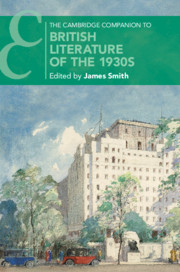Book contents
- The Cambridge Companion to British Literature of the 1930s
- The Cambridge Companion to British Literature of the 1930s
- Copyright page
- Contents
- Notes on Contributors
- Introduction
- Chapter 1 Poetry
- Chapter 2 The Literary Novel
- Chapter 3 Drama
- Chapter 4 Publishing and Periodicals
- Chapter 5 The Middlebrow and Popular
- Chapter 6 Modernism
- Chapter 7 Communism and the Working Class
- Chapter 8 Empire
- Chapter 9 Travel
- Chapter 10 The Regional and the Rural
- Chapter 11 The Queer 1930s
- Chapter 12 Remembering and Imagining War
- Chapter 13 Fascism and Anti-Fascism
- Chapter 14 Fashioning the 1930s
- Index
- Cambridge Companions to …
Chapter 6 - Modernism
Published online by Cambridge University Press: 18 December 2019
- The Cambridge Companion to British Literature of the 1930s
- The Cambridge Companion to British Literature of the 1930s
- Copyright page
- Contents
- Notes on Contributors
- Introduction
- Chapter 1 Poetry
- Chapter 2 The Literary Novel
- Chapter 3 Drama
- Chapter 4 Publishing and Periodicals
- Chapter 5 The Middlebrow and Popular
- Chapter 6 Modernism
- Chapter 7 Communism and the Working Class
- Chapter 8 Empire
- Chapter 9 Travel
- Chapter 10 The Regional and the Rural
- Chapter 11 The Queer 1930s
- Chapter 12 Remembering and Imagining War
- Chapter 13 Fascism and Anti-Fascism
- Chapter 14 Fashioning the 1930s
- Index
- Cambridge Companions to …
Summary
In a lecture delivered early in 1936 entitled ‘Poetry and Film’, W. H. Auden offered a Marxist-shaded characterisation of modernism within a brief, reductive account of the historical division of high and low art. The class divisions that grew out of the Industrial Revolution, Auden asserted, had also given rise to an intermediate social element, ‘a class of people living apart from industry but supported by its profits – the rentier class’. Modernism, Auden claims, can be understood as nothing other than ‘rentier art’, an artistic expression of the outlook of this dependent, impractical side-branch of the industrial ruling class: ‘A distinct type of art arose […] developing through Cezanne, Proust and Joyce.’ In what follows, Auden does not further linger over this dismissive account of three great innovators of modern art and literature, but hastens on to the real focus of his lecture, which is popular art and specifically the art of film.
- Type
- Chapter
- Information
- The Cambridge Companion to British Literature of the 1930s , pp. 97 - 112Publisher: Cambridge University PressPrint publication year: 2019
- 1
- Cited by

